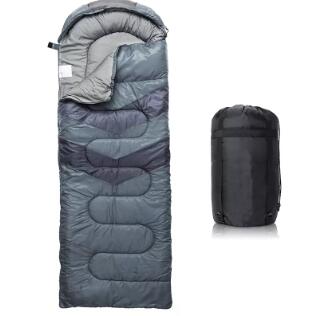Choosing the Right Camping Sleeping Bag: Backpacking vs. Car Camping Considerations
2024-02-19
Introduction:
One of the key decisions campers face when selecting a sleeping bag is determining whether it's suitable for backpacking or car camping. Each camping scenario comes with its own set of considerations, particularly concerning the size and weight of the sleeping bag. In this blog post, we'll explore the factors to consider when deciding if a sleeping bag is best suited for backpacking or car camping based on its compact size.
Backpacking vs. Car Camping:
Before diving into the specifics, let's briefly differentiate between backpacking and car camping:
1. Backpacking: Backpacking involves hiking into remote wilderness areas with all necessary gear packed into a backpack. As such, weight and packability are critical considerations when selecting camping equipment, including sleeping bags.
2. Car Camping: Car camping typically involves driving to a designated campsite where gear can be easily transported from the vehicle to the camping spot. Unlike backpacking, weight and packability are less of a concern as gear can be stored and transported in the car.
Compact Size for Backpacking:
When considering whether a sleeping bag is suitable for backpacking due to its compact size, several factors come into play:
1. Weight: Backpackers aim to minimize the weight of their gear to reduce fatigue and strain during long hikes. A lightweight sleeping bag is essential for backpacking, as it contributes to the overall pack weight. Sleeping bags designed for backpacking are typically lightweight and compressible, making them easy to pack and carry.
2. Packability: Space is limited in a backpack, so a sleeping bag's packability is crucial for maximizing storage efficiency. Compact sleeping bags that compress down into a small stuff sack are ideal for backpacking, as they take up minimal space in the backpack.
3. Insulation: Despite their compact size, backpacking sleeping bags must still provide adequate insulation to keep campers warm in varying outdoor conditions. High-quality insulation materials and construction techniques are employed to balance warmth with packability in backpacking sleeping bags.
Suitability for Car Camping:
While compact size is less of a concern for car camping, there are still benefits to choosing a sleeping bag that is easy to transport and store:
1. Convenience: Even though gear can be transported in a vehicle, compact sleeping bags are still convenient for car camping as they take up less space in the trunk or storage area.
2. Storage: Car camping gear often needs to be stored when not in use, especially during off-season months. Compact sleeping bags are easier to store in closets or storage bins compared to bulkier options.
3. Versatility: Compact sleeping bags designed for backpacking can also be used for car camping, providing versatility for campers who enjoy both types of outdoor experiences.
Conclusion:
Whether a sleeping bag is suitable for backpacking or car camping due to its compact size depends on various factors including weight, packability, and insulation. Backpackers prioritize lightweight and compressible sleeping bags that are easy to carry on long hikes, while car campers may also appreciate the convenience and versatility of compact sleeping bags. By considering these factors, campers can choose the right sleeping bag to suit their outdoor adventure preferences, whether they're hitting the trails or setting up camp by the car.



